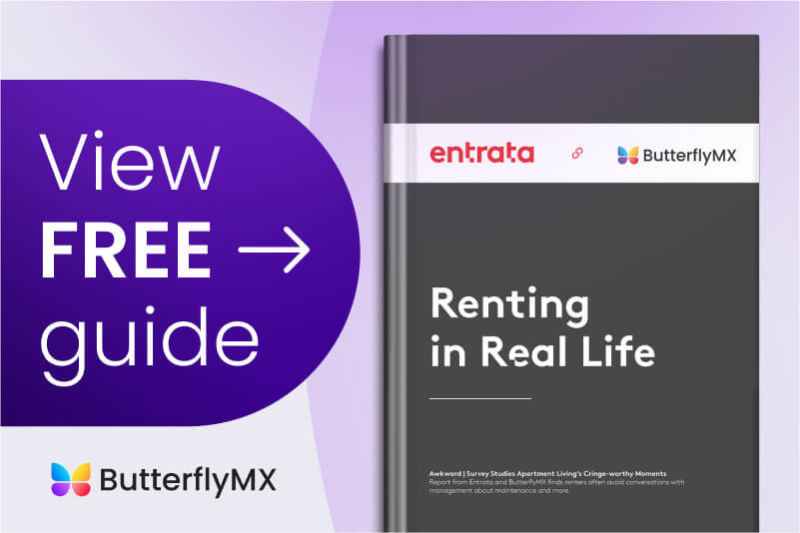Key takeaways
- A tenant guest policy is crucial for multifamily properties because it reduces the chances of guests becoming residents without following proper procedure.
- The difference between a tenant and a guest is that the former must pay rent and uphold other responsibilities outlined by the lease.
- Some signs of a guest-turned-tenant include regular overnight stays, moving furniture into the unit, and paying rent.
- Your rental guest policy should set occupancy limits, outline guest parameters, and introduce guest time limits.
- Each state has different laws that outline when guests become tenants.

Tenants are always welcome to invite guests over for the night. However, guests can overstay their welcome from a property manager’s perspective, creating many legal challenges. So, you must know how to manage all visitors who spend time at your property using a tenant guest policy.
With that said, this guide will cover what you need to know about managing guests at your property. You’ll discover the difference between tenants and guests, the stipulations of a guest becoming a tenant, and potential signs to stop such an event from occurring. Most importantly, you’ll learn what goes into creating a tenant guest policy.
This post covers:
- Importance of a tenant guest policy
- What is the difference between a guest and a tenant?
- When does a guest become a resident by state?
- Signs a guest has become a tenant
- How to write a tenant guest policy
- Tenant guest policy FAQs
Importance of a tenant guest policy
Tenant guest policies are an essential aspect of any lease agreement because they’re designed to protect the property from possible damages. More importantly, guest policies help prevent guests from becoming tenants, which warrants many legal problems.
For instance, depending on the state, a guest can legally claim residency in a unit after staying there for a certain period of time. Meanwhile, guests are not contractually obligated to pay rent or uphold other agreements because they have not signed a lease like a tenant.
For this reason, you must include a tenant guest policy in your lease agreement or alongside it in a separate document. Ensure your residents sign the written policy for a concrete record to refer to in the event of violations.
Overall, thoroughly vetting residents for rental verification reduces the chances of tenants and their guests taking advantage of your property.
Watch how ButterflyMX works:
What is the difference between a guest and a tenant?
Generally, the difference between a guest and a tenant is that the latter is contractually obligated to pay rent. Guests are not listed on the lease agreement, meaning they have no responsibility to uphold it.
On the other hand, tenants must pay the agreed-upon rate and maintain any other obligations, such as paying utility bills and maintaining the unit’s appearance. Of course, tenants are legally allowed to have short-term guests per tenants’ rights, but when guests stay too long, it creates problems for the property.
Check your state’s laws before making management decisions for more detailed information.
Here’s an overview of residents vs. guests:
When does a guest become a resident by state?
Your state determines when a guest becomes a resident. Guests may become residents after staying at the property for several days.
For example, in Connecticut, guests become tenants after staying at the property for 14 days within a six-month period. Conversely, states may require guests to stay longer or may not even list an official number. Instead, some states leave it up to individual properties to define what guests and tenants are in the lease.
Several states do not provide details on when a guest becomes a tenant. Rather, they delegate that task to landlords via the lease.
The states that do not outline when guests become tenants include:
- Alaska
- Arkansas
- Delaware
- Hawaii
- Idaho
- Iowa
- Kansas
- Louisiana
- Massachusetts
- Michigan
- Nebraska
- Nevada
- New Hampshire
- New Jersey
- New Mexico
- North Dakota
- Oklahoma
- Oregon
- Rhode Island
- South Carolina
- South Dakota
- Utah
- Vermont
- Virginia
- Washington
- West Virginia
- Wisconsin
- Wyoming
State laws regarding guests-turned-tenants
Here are the states that do explicitly state when guests are considered tenants:
Disclaimer: State laws are subject to change, and reviewing and verifying the latest statutes and regulations is essential. This document does not constitute legal advice, and you should consult with your legal counsel to obtain guidance tailored to your situation.
Signs a guest has become a tenant
Before you take action against a possible guest-turned-tenant, you should be wary of the signs.
Here are some ways to determine if a guest has taken up permanent residence:
- Regular overnight stays. Do you have a tenant whose partner stays over for weeks at a time? If so, they may have inadvertently become a tenant. To check the frequency of overnight stays, monitor your security footage, access control system logs, or visitor parking.
- Moved assets. Keeping a spare set of clothes at a friend’s apartment is common, but moving in furniture is not. If your residents’ guests have moved in large furniture or a disproportionate amount of personal belongings, they’ve likely begun to consider your property their home.
- Received mail or packages. Have you noticed a new name popping up in your mailbox or package room? It could mean a guest has changed residency to your property, which is often done by receiving mail or requesting a change of address.
- Paying rent. In some states, the moment a guest contributes to rent, they become a resident. So, if you see a new individual’s payment information in the resident portal or an existing tenant starts splitting rent, it could mean a guest has taken occupancy.
- Possesses keys. When an individual other than the tenant owns a set of keys, it could mean a guest has started living there. However, this is not a sure sign, as many tenants offer their friends and family keys in the event of going out of town or in emergencies. Thus, you shouldn’t solely rely on a guest possessing keys as a sign they’ve taken residency.
How to write a tenant guest policy
If you don’t have a written guest policy in your apartment, you are vulnerable to liability for damage caused by unapproved guests. So, ensure each resident agrees to your apartment guest policy.
Further, make sure you explain the differences between guests and occupants in the policy. This way, your residents don’t unintentionally turn their guests into permanent residents.
Here are a few tips for creating a fair renter guest policy:
- Set occupancy limits. You can set a maximum occupancy limit based on each unit’s floor plan and square footage. Check local laws to find out the legal occupancy limits in your area. This is a good way to initially prevent unauthorized occupants, but it doesn’t do much in the way of monitoring guests.
- Outline guest parameters. Property owners have the final say over who is and isn’t allowed to stay on the property. That being said, most residents will host guests from time to time. So, it’s important to be flexible. However, make sure your residents know your specific rules for guest occupancy. This may be a limited number of consecutive nights, a limited number of guests, or a limited number of stays per month.
- Introduce guest time limits. As previously stated, you can limit the amount of time guests can spend at your property without further authorization. This limit can be introduced in several ways, including a limit of three nights per week, 10 nights per month, or 30 nights per six months.
What is a reasonable tenant guest policy?
A reasonable tenant guest policy does a few things:
- It takes into account that all residents will have guests at some point.
- Is written into the lease agreement so it can be referred to at any time.
- Adheres to local laws and regulations.
Tenant guest policy FAQs
Here are some frequently asked questions by tenants regarding their guests:
How long can a guest stay in my apartment?
It’s best to limit your guest’s stay to the number of days/nights outlined in your lease agreement or guest policy. Otherwise, your landlord may take action, or your guest could legally consider your apartment their residence if the state’s conditions are met.
Can a landlord say no overnight guests?
Yes, landlords can prevent you from having overnight guests or limit the number of nights guests can stay if the lease defines it.







